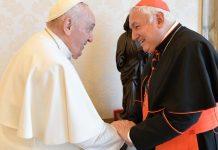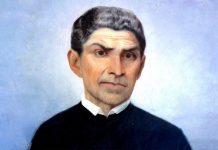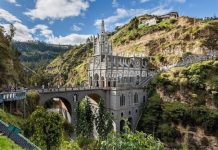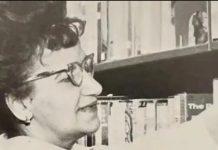In his preaching in Italy and France, St Anthony of Padua encouraged the faithful and fought heretics. When he was exhumed, his tongue was intact.
Newsdesk (16/01/2024 19:40, Gaudium Press) St. Anthony was born in Lisbon in 1295. As his father was related to the commander of the First Crusade, Godfrey of Bouillon, he was baptised Fernando de Bouillon. During his childhood, he studied at the school next to Lisbon Cathedral and, during his adolescence, at a monastery in Coimbra.
In that city, he met some Franciscan friars and wanted to join that religious congregation. St. Francis of Assisi, who was in Italy, appeared to him in a mystical vision and recommended that he join the Order of Friars Minor. In 1220, he began to wear a habit and changed his name to Antonio.
Desiring to shed his blood for the Church, he travelled to Morocco, North Africa, which was dominated by the Mohammedans. But, struck down by a serious illness, he took a ship to return to Portugal.
Due to a terrible storm, the ship grounded on the island of Sicily. On foot, he visited various Franciscan convents in Italy asking them to accept him as a religious, as he belonged to the Order of Friars Minor. However, he was always rejected.
Finally, a convent in Romagna, northern Italy, took him in out of compassion. There he led a life of prayer, penance and study.
Extraordinary purity and serenity
Analysing a painting of St. Anthony of Padua made at the time he was alive, Plinio Corrêa de Oliveira describes him as follows:
“The hooked nose (…) has something of the beak of a bird of prey. In the arch of his eyebrows, there is a delicacy, precision and strength that his gaze expresses above all.
“From a certain point of view, it’s a glacial look. It doesn’t show any emotion. What appears is analysis – the kind of analysis that only the peaceful do. In this gaze you can see all the precision of someone who has been through all the disappointments; he has seen everything as it is, he knows about Original Sin and its effects, satan with his pomps and his works. Everything is analysed, catalogued, he has extraordinary discernment.
“The edges of his lips are fine and very ordered. He has the responsiveness that makes him a hammer preparing to strike. There is an extraordinary purity, chastity and serenity.“[1]
Theology professor and popular preacher
One day, there was a priestly ordination ceremony in Romagne. The presiding bishop, without any prior warning, appointed St. Anthony to give the homily after the Gospel reading.
With total unpretentiousness, the man of God demonstrated such knowledge of Sacred Scripture that everyone was amazed.
When he was informed of this, St. Francis ordered him to study theology at Verceil – located between Milan and Turin – with the famous Thomas Gallo. By the brilliance of his intelligence, he astonished the teachers and students, and Thomas said that “the new disciple’s progress in the Sacred Sciences seemed to be more the fruit of the ardour of his soul than of intellectual development.”[2]
When he finished his studies, he was ordered to teach theology in Franciscan convents in Italy and the south of France. At the same time, he preached to the people, training the faithful, challenging the heretics – Waldensians and Albigensians – and performing prodigious miracles.
Miracles of the mule and the fish
Among the miracles, we cite the following:
An Albigensian denied the real presence of Christ in the Eucharist. He said that he would only believe if a hungry mule showed some respect in front of the Host.
St. Anthony placed a ciborium with the Blessed Sacrament on a table and ordered them to open the enclosure where the mule had been without food for three days. As it passed in front of the table, the animal turned towards the Host and knelt down, and only then it went to eat its oats…
“On one occasion, when he was in a seaside village full of heretics, St Anthony set out to preach about divine omnipotence. As no one came to listen to him, he turned to the sea and said: ‘Since there is no one here who wants to hear the word of God, you pure creatures, come and listen to me so that the indocility of these wicked may be confounded.’
“Soon thousands of fish appeared and, sticking their heads out of the water, seemed to be paying great attention to St. Anthony’s preaching. At the end of his exhortation, he gave them his blessing and bade them farewell.
“Faced with such a miracle, all the people were converted.”[3]
In Rome, he preaches to an immense multitude
Pope Gregory IX ordered him to go to Rome to preach to the pilgrims who would be there for the Holy Week ceremonies.
St. Anthony of Padua obeyed and gave a sermon to a huge crowd. As well as Italians, there were Iberians, Greeks, French, Germans, Slavs and English. There was a miracle similar to the one that happened to St. Peter on the day of Pentecost: everyone understood him in their own language.
Friar Elias of Cortona, St Francis of Assisi’s successor as Superior General of the Franciscans, “saw our Saint as an opponent of his plans for relaxation”. [4]
His slackness in complying with the Rule encouraged other moral disorders. Elias became a supporter of the nefarious Emperor Frederick II, who had revolted against Pope Gregory IX and was excommunicated. Shortly afterwards, this pontiff excommunicated Elias from Cortona.
“Hammer of the heretics”
In 1229, the man of God moved to Padua – northern Italy – where his preaching and miracles attracted crowds. One day, when he was in a village, he felt ill and asked to be taken to Padua. On the way, his condition worsened and he was taken to a convent of Poor Clares in Arcelli, where he gave his soul to God. It was June 13th, 1231.
Such was the number of miracles performed through him that Gregory IX canonised him only eleven months after his death. A splendid basilica was built in his honour in Padua.
When his remains were transferred to the new church, his tongue was found to be intact. St Anthony had used this organ so much to fight the enemies of the Church that he became known as the “Hammer of the Heretics”.
In 1946, Pius XII honoured him with the title of “Evangelical Doctor”.
By Paulo Francisco Martos
Noções de História da Igreja
[1] CORRÊA DE OLIVEIRA, Plinio. Ansiedade jubilosa do maravilhoso. In Dr. Plinio. Ano XIX, n. 225 (dezembro 2016), p. 35.
[2] VACANT, A., MANGENOT, E. Dictionnaire de Théologie catholique. Paris: Letouzey et Ané. 1909, v. 1-I, coluna 1446.
[3] Idem. Operando maravilhas…In Dr. Plinio. Ano XIII, n. 147 (junho 2010), p. 2.
[4] VACANT, A.; MANGENOT, E. Dictionnaire de Théologie catholique. Paris: Letouzey et Ané. 1909, v. 1-I, coluna 1446.
Compiled by Roberta MacEwan


































